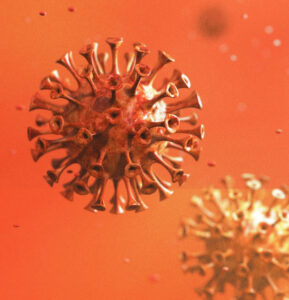The short answer is yes; illness can trigger arthritis flare-ups.
Have you had a cold or flu this winter and found that your arthritis symptoms have worsened? Or you’ve had COVID-19, gotten through the worst of that, done your 7 days penance, then your body has decided that wasn’t quite enough of a disruption to your life and given you an arthritis flare-up.
If this sounds familiar, you’re not alone; this is a common occurrence as illness can trigger arthritis flare-ups.
So what’s going on here?
A flare is a temporary increase of disease activity or worsening symptoms. You may be doing the things you usually do to manage your arthritis, but suddenly, they aren’t working, and your symptoms worsen. There is usually a trigger for a flare, and different types of arthritis have different triggers. Respiratory infections like a cold, flu or COVID-19 are a trigger for autoimmune conditions.
 How it works:
How it works:
An infection exposes the body to foreign living substances like bacteria, viruses, or parasites. We’ve seen the images of the COVID virus across our screens for the last two years, so you can picture what this “foreign living substance” might look like. The body’s natural reaction is to send in immune cells to get rid of the foreign substance, which results in helpful inflammation. Our immune cells are basically an army that is conscripted into action when alerted, with different tactics to destroy the invader and add the invader’s shape to memory as an “enemy” in case there’s a next time so you can defend even quicker. When the body sends the immune cell army in, this results in helpful inflammation, but in people with auto-immune arthritis, this can lead to a flare-up of symptoms.
In autoimmune conditions, infections are thought to trigger a flare-up through a process called molecular mimicry. This is when the foreign substance is shaped very similarly to a naturally occurring substance in our own body. The immune cells may start attacking both the naturally-occurring substance and the similar-shaped foreign substance, triggering a flare-up.
It’s a tricky situation for people taking medications such as corticosteroids (e.g. prednisone) and biologics (e.g. Amgevita) as these can lower immunity and increase vulnerability to infection. But at the same time, decreasing medication and forgetting to take medication can lead to a flare.
 Prevention is better
Prevention is better
A massive positive of the COVID-19 pandemic is that infection prevention measures have been normalised. People are more likely since the pandemic to stay at home when they are sick than go to work, mask-wearing is commonplace, and vaccination is more widely understood, which goes a fair way in protecting those who are immunocompromised and stopping the spread of illness.
Allergies, skin infections and infections in joints can also contribute to flares.
In winter, during the cold and flu season, you are more likely to get an infection, which may trigger a flare. General Practitioner, Dr Kate Mitchell, says that getting your flu vaccination each year and staying up to date with the recommended COVID-19 vaccinations can significantly lower your chances of getting sick and triggering an arthritis flare.
Medical review and contributions by Dr Kate Mitchell, General Practitioner.
See our resources below for more information on preparing for a flare-up.
References
Arthritis Flare-Ups: What a Flare Feels Like and How to Treat It (creakyjoints.org)
Autoimmune Diseases & Their Possible Environmental Triggers (hss.edu)
Reactive arthritis | Causes, symptoms, treatments (versusarthritis.org)
Arthritis Flares: How to Manage and Prevent Them (creakyjoints.org)
Coyne P, Hamilton J, Heycock C, Saravanan V, Coulson E, Kelly CA. Acute lower respiratory tract infections in patients with rheumatoid arthritis. J Rheumatol. 2007 Sep;34(9):1832-6. Epub 2007 Jul 15. PMID: 17659759.